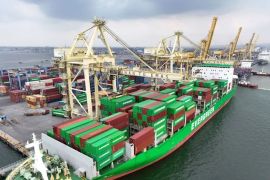President Joko Widodo (Jokowi) has stressed that Indonesia needs to have the ability to face the challenges of crisis and global recession.
"We hope that Indonesia is not impacted by the global recession," he said in early January 2023.
When talking about recession, the energy sector needs to be given serious attention as it is a fundamental part of the national economy. Without enough energy supplies, machines at factories that provide jobs to millions of workers cannot be operated and freight vehicles carrying products cannot be distributed.
Although many economists have projected grave impacts from the global recession, Indonesia's energy sector is considered resilient in facing those threats.
Indonesia has several and more than enough resources that support energy independence and security—the wheel that drives the national economy.
Strength of fossil fuel energy
When several COVID-19 waves hit Indonesia and triggered an economic slowdown from 2020-end to early 2021, fossil energy sources, including oil, natural gas, and coal, still managed to support economic growth in some regions.
According to the special task force for upstream oil and gas business activities (SKK Migas), every US$1 million of investment in oil and natural gas can generate added value of up to US$1.6 million, create 100 new jobs, and increase the gross domestic product (GDP) to US$700 thousand.
The above contribution excludes state income gained from the upstream sector of natural gas and oil. The participation right of 10 percent for regions that produce oil and natural gas can also contribute to regional tax and retribution, absorb local labor, and encourage goods and services procurement business and corporate social responsibility (CSR).
In 2020, the oil and natural gas upstream sector contributed Rp122 trillion, or around US$7.28 billion, reaching 144 percent of the 2020 revised state budget (APBN-Perubahan) target.
In 2021, state income from the oil and natural gas upstream sector amounted to Rp206 trillion or US$13.67 billion, reaching 188.8 percent of the 2020 state budget target.
In addition, the upstream oil and gas industry is aiming to increase national oil and gas production to 1 million barrels of oil per day and 12 billion cubic feet of gas per day, respectively, by 2030, SKK Migas informed.
Since April 2020, the government has provided gas at a cheap price of US$6 per MMBtu (1 Million British Thermal Units) to seven industry and electricity sectors to bolster utilization and competitiveness among corporates in the country.
The 7 sectors are fertilizer, petrochemical, oleochemical, steel, ceramic, glass, and rubber hand glove industries. Because of cheap gas prices, the sectors have managed to operate amid increasing prices.
Meanwhile, coal and mineral have also contributed positively to state revenue every year. In 2021, state income from coal and mineral mining amounted to Rp124.4 trillion, or around US$8 billion. The figure covered tax, excise tax, and non-tax state revenue.
Indonesia's wealth in fossil energy sources also makes its electricity costs the cheapest in Southeast Asia.
The average electricity tariff in Indonesia for low voltage is Rp1,445 per kilowatt hour (kWh). The price is much lower compared to Malaysia (Rp1,735 per kWh), Vietnam (Rp1,943 per kWh), and Singapore (Rp2,110 per kWh).
For middle voltage, Indonesia is still providing the cheapest rate in ASEAN at Rp1,115 per kWh, compared to Malaysia, which charges Rp1,227 per kWh, Thailand Rp1,370 per kWh, the Philippines Rp1,603 per kWh, Vietnam Rp1,787 per kWh, and Singapore Rp2,063 per kWh.
When the national economy slows down, Indonesia's fossil energy sources can help drive the economic wheels throughout the region.
New renewable energy
When fossil fuel prices spiked due to the Russia-Ukraine geopolitical conflict, with oil prices surging above US$100 a barrel, gas prices above US$10 per MMBTu, and coal prices above US$400 per ton, Indonesia was also affected.
However, it was not wholly impacted because of its potential to produce 3 thousand gigawatts of new renewable energy sourced from solar, wind, hydropower, and lava. Indonesia can produce energy independently to realize energy security by combining fossil energy sources.
According to the Energy and Mineral Resources Ministry, in the 5 years till July 2022, the increased capacity of clean energy power plants reached 2,576 MW, with an average increase of 5 percent per year.
Indonesia has devised several strategies to develop clean energy and support the energy transition, such as the construction of on-grid clean energy plants, the implementation of rooftop solar power, the conversion from oil-powered plants to clean power plants, biomass co-firing technology, exploration of geothermal energy, and off-grid implementation of clean energy.
With the many strengths that Indonesia has in terms of energy, it is ready to face the threat of global recession by not depending on any country, but still increasing its own energy supply and affordability.
Related news: BI outlines five global economic risks in 2023
Related news: Expecting a better Indonesian economy in 2023
Editor: Rahmad Nasution
Copyright © ANTARA 2023












